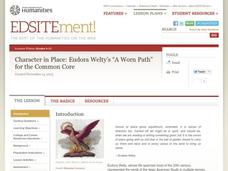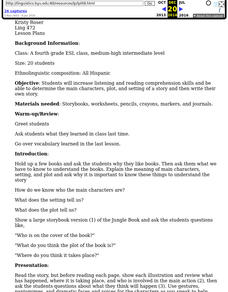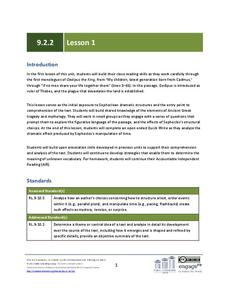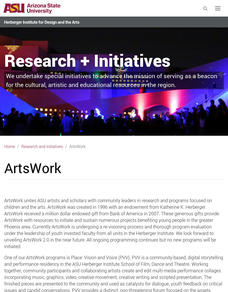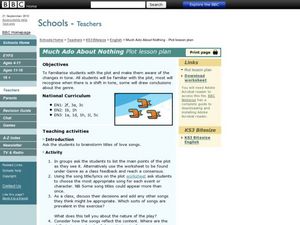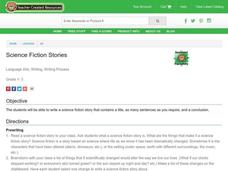Curated OER
Lights, Camera, Action...Crossing the Delaware in 9 Scenes
How does reading a drama differ from reading a novel? Middle schoolers become playwrights and explore these differences. After viewing the A&E movie,"The Crossing," groups create stage directions, write dialogue, and design sets and...
National Endowment for the Humanities
Character in Place: Eudora Welty’s “A Worn Path” for the Common Core
How do writers use the interaction between elements like characterization and setting to create meaning? Readers of "A Worn Path" create a series of comic book-style graphics of Eudora Welty's short story and reflect on how Welty...
Curated OER
Language Practice
The simple instructional techniques described in this plan will help young readers learn and practice basic reading skills and strategies. Before reading, introduce your readers to the meaning of main character, setting, and plot. Then...
Curated OER
Theatre Vocabulary ad Elements
Fifth graders examine basic theatre vocabulary and use it to discuss a play. In this theater lesson, 5th graders identify the elements of a play. Students perform their play and use theatre vocabulary to explain their...
Curated OER
Story Pyramids
Young writers generate descriptive words. They use pictures of various landscapes (from books, magazines, or the Internet) and complete a story pyramid. The pyramid (included here) asks to describe the main character, the setting, and...
K20 LEARN
Criminal Motivations: Irony and Characterization In "The Cask Of Amontillado"
Edgar Allan Poe's short story "The Cask of Amontillado" is a bit of a puzzle. Critics have long debated Montresor's motives for killing Fortunato. Young scholars examine examples of the three types of irony (verbal, dramatic, and...
EngageNY
Grade 9 ELA Module 2, Unit 2, Lesson 1
Delve into the heart of dramatic dialogue with a unit focused on Oedipus the King by Sophocles. Having completed an online exploration about ancient Greece beforehand, ninth graders read the play's opening lines and analyze how...
EngageNY
Grade 9 ELA Module 2, Unit 2, Lesson 19
Now that readers can see the full scope of Sophocles' Oedipus the King, they can draw connections between the dramatic ending and the textual evidence throughout the Greek tragedy. As they prepare for the unit assessment writing prompt,...
Curated OER
The Russian Revolution
Students explore the Russian Revolution through dramatization. For this Russian Revolution lesson, students participate in drama workshops prior to writing and presenting one-act plays featuring figures of the revolution.
Curated OER
Creating Plays from Children's Stories
Students explain how individual elements (e.g., plot, theme, character, conflict, etc.) comprise the structure of a play. They write an original one-act play with developed characters, specific setting, conflict, and resolution.
EngageNY
Grade 10 ELA Module 4: Unit 2, Lesson 12
How do the Three Witches' interactions with Macbeth advance the plot of Shakespeare's Macbeth? Learners complete a Quick Write to answer the question. They also participate in a whole-class dramatic reading of Act 4.1.
BBC
Tales of Hans Christian Andersen
Fairy tales seem like quick, fun children's stories, but asking compelling questions about characters, plot elements, and literary themes can transform them into rich and complex tales. Use a series of eight lessons on Hans Christian...
Workforce Solutions
Survivor Island
Decisions, decisions! Small groups decide on their dream career then enter a scenario that challenges them to make another big decision—if stranded on a deserted island, who would be saved or fed to the sharks. Because decisions are...
Curated OER
Much Ado About Nothing Plot Lesson Plan
Students explore tone in "Much Ado About Nothing." In this literary elements instructional activity, students list the main points of the plot, identify shifts in tone, and select love songs that reflect the tone of events and/or...
Curated OER
Science Fiction Stories
Students review the story writing process and the elements such as prewriting, drafting, editing, revising, publishing, and assessment. Next students write a science fiction story that contains a title, the requested number of...
Curated OER
Exploring A Streetcar Named Desire
High schoolers investigate the dramatic elements of a Streetcar Named Desire. In this drama instructional activity, students explore the theme of the Tennessee Williams play as they read the play and watch performances of some of the...
Curated OER
Arthur Miller and The Crucible
Young scholars investigate the dramatic elements of The Crucible. In this drama lesson, students explore the elements and themes of the Arthur Miller play as they read the play and watch performances of some of the acts. Young...
Curated OER
Narrative Nuts and Bolts
After viewing slides and reading about child labor, young authors compose an original narrative story. They practice note-taking skills and work to effectively engage a reader by incorporating plot, logical order, complex characters,...
Curated OER
Types of Irony: Examples & Definitions
Isn’t it ironic that many situations labeled ironic aren’t? Properly labeled examples of verbal, dramatic, and situation irony are defined and illustrated in a short, animated video that uses passages from literary works as models. The...
Novelinks
The Devil’s Arithmetic: Concept Analysis
A helpful guide to Jane Yolen's The Devil's Arithmetic for your literature unit. Use the sections on point-of-view, dramatic irony, and background knowledge, among others, to frame your lessons in an engaging and educational way.
Curated OER
Drama Genre Focus Lesson
Students examine the elements of drama to develop an appreciation and understanding of the genre. For this lesson students read, analyze, discuss, and review a dramatic selection.
Curated OER
Using Visual Art to Create Scenes
Pupils review scene structure and the elements beginning, middle and end. They view a piece of art to stimulate an idea for a improvised scene. Students work in small groups, create and then perform their scenes for the rest of the class.
Brigham Young University
Putting Ideas Together
As part of their study of set design, theater arts students put together what they have learned so far and create a thumbnail sketch of a set that they feel captures the style and mood they want to project.
Brigham Young University
To-Scale Models
Guided by their analysis of a scene, their initial sketches, and renderings, set designers begin to craft a scaled, 3-D model of the set of the play they have chosen.
Other popular searches
- Elements of Dramatic Poetry
- Dramatic Elements Workshops
- Role in Dramatic Elements
- Dramatic Elements Contrast
- Drama Dramatic Elements

